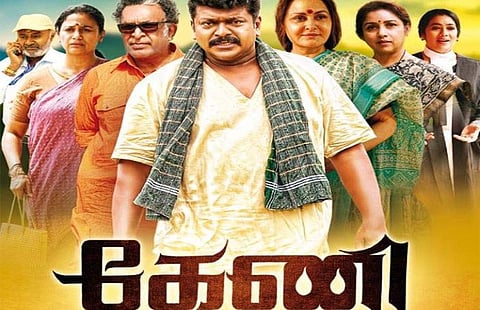

Keni has convinced me that there is indeed such a thing called too much ambition. Director MA Nishad wants to say it all in this film. He wants to expose the politics surrounding social issues. He wants to give the media stick for its irresponsible selection of news. He wants to show the valiance of activism. He wants to touch upon topics like Maoism and Marxism. He wants to show the futility of borders, of being passionately devoted to aspects of your identity you have no control over — like your birthplace, for instance. And he wants to do it all, while making a bilingual. I know what you’re thinking, and you’re right. Indeed, no film around two hours long can hope to do justice to the nuances of such topics — not with the frivolous approach that's evident in Keni, anyway.
Almost half of Keni is in Malayalam, while the other half is in Tamil. And for once, a film has good reason to be a bilingual, for, its story takes place in Puliyanmala, a village situated on the border of Kerala and Tamil Nadu. It’s a place whose inhabitants speak both Tamil and Malayalam. Interestingly, Nishad has retained the Malayalam portions (Tamil, in the film’s Malayalam version), as is. You simply get subtitles, which results in the uniquely uncomfortable experience of watching half the film, and reading the other half. I dare say that a more elegant solution would have been to dub over the non-Tamil portions, so you don’t get half a film and half a book.
Director: MA Nishad
Cast: Jaya Prada, Nasser, Anu Hasan, Rekha, Revathi, Parthiepan
In settling for superficial treatment, Keni leaves your appetite for depth wholly unattended. Despite the presence of not one or two but three journalists who set out on a hunt for an elusive top story, you get no real insight into the workings of a reporter. There’s little nuance about the politics behind the issue in the film, and perhaps most disappointingly, little understanding about the transformation of Indira (Jaya Prada), who turns from a docile, timid wife into a passionate activist. The director may have had more time to spend on these transitions had he resisted the constant urge, it seems, to lighten the material with ill-advised jokes. Towards the end, the judge (Rekha, who doesn’t at all seem comfortable in the role), is pondering the complications of the case on her hand, and a side-character asks her to take leave, so she doesn’t have to think about the judgment. It’s supposed to be a joke, but even if it were efficient, it’s thoroughly misplaced, given the mood of the film. In a film more moved by the issues it’s talking about, the idea of a disputed well near the border of Kerala and Tamil Nadu could have made for a more powerful film that’s scathing of a general loss of humanity in contemporary society.
Part of the problem is also the constant half-hearted attempts at doing justice to the dozen characters in the film, including ones played by top actors like Anu Hasan, Revathi, Nasser, and Parthiban. They’re all monochromatic characters. Parthiepan’s village head is there for the funny insults; Anu Hasan’s mother for the melodrama; Nasser’s lawyer for the appeal to conscience; and Revathi’s collector for…. Revathi’s presence.
Keni’s biggest failure though is how little impact even its heroine, Indira, has on you. It’s on account of regular breaking of one of storytelling’s fundamental rules: Show, don’t tell. Keni’s characters are constantly praising her to the skies and back, and promote an aura of heroism the character itself doesn’t seem to show a whole lot of. There’s just way too much vacuous talk. In fact, towards the end, the characters get so carried away that they seem to begin duelling in a contest of ‘Quotable quotes’. Nasser quotes Karl Marx and Vallalar. Rekha quotes Gandhi. Someone else quotes Mother Teresa. In fact, Mother Teresa is quoted at least five-six times for some reason. Even that doesn’t do much to salvage the film.